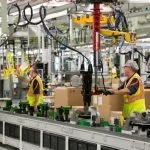
(WASHINGTON) — Autoworkers, farmers and alcohol distillers are among a set of U.S. workers who risk losing their jobs as a result of potential tariffs on Canada, China and Mexico, experts told ABC News.
The U.S. president was expected to sign executive orders on Tuesday putting in place the 25% tariffs on goods from Mexico and Canada and 10% tariffs on those from China, according to the White House.
Trump announced on Monday that the proposed tariffs on most goods from Canada and all products from Mexico would be paused for one month, putting the policies on schedule to take effect in early March. The postponements came following conversations Trump had with Mexican President Claudia Sheinbaum and Canadian Prime Minister Justin Trudeau. Trump said Monday afternoon he plans to talk to China in the next day or two about tariffs on that country.
Some U.S. shoppers and economists have raised alarm about the potential for tariff-driven price increases, since importers typically pass along a share of the cost of the higher taxes to consumers.
A lesser-known effect of the potential tariffs, however, could arise as some retailers struggle to sell imported goods at competitive prices while manufacturers reckon with higher costs of raw materials such as car parts and lumber, experts said. Sales could wobble, they added, leading directly to job cuts.
Potential retaliatory tariffs slapped on U.S. exports could prove another cause of layoffs, the experts said, since U.S. firms dependent on selling products overseas risk weakened performance.
“It’s like Trump took a grenade and threw it into the economy, and he walked away to see what happens,” Rob Handfield, professor of operations and supply chain management at North Carolina State University, told ABC News.
The Trump administration did not immediately respond to ABC News’ request for comment.
In a series of social media posts over the weekend, Trump said the tariffs target Canada, Mexico and China for hosting the manufacture and transport of illicit drugs that end up in the United States. In a Truth Social post on Sunday, Trump urged the three countries to address his concerns, while acknowledging the tariffs may cause some financial hardship within the U.S.
“WILL THERE BE SOME PAIN? YES, MAYBE (AND MAYBE NOT!). BUT WE WILL MAKE AMERICA GREAT AGAIN, AND IT WILL ALL BE WORTH THE PRICE THAT MUST BE PAID,” Trump wrote.
In recent days, some trade associations and labor unions voiced warnings about tariff-related job losses.
Jay Timmons, president and CEO of the National Association of Manufacturers, said small- and medium-sized firms in the sector employing millions of Americans risk “significant disruptions” as a result of potentially high energy prices and costly supply chain workarounds.
“Manufacturers will bear the brunt of these tariffs,” Timmons said, adding that the policies would put “American jobs at risk.”
Distilled Spirits Council, a trade association representing alcohol makers across North America, cautioned that tariffs would harm business in all three countries. “Maintaining fair and reciprocal duty-free access for all distilled spirits is crucial for supporting jobs and shared growth,” the group said.
The risks for U.S. workers are perhaps best demonstrated by the auto industry, which employs about 4 million people, experts said.
U.S. automakers hold deep ties to Canada and Mexico, since products often snake back and forth between the countries before a car reaches full assembly, Christopher Conlon, a professor of economics at New York University who studies trade, told ABC News.
Mexico and Canada make up the top two U.S. trading partners for both finished motor vehicles and car parts, according to a Cato Institute analysis of data from the U.S. International Trade Commission.
“The supply chains involve shipping parts back and forth over the border five times, six times, seven times. If every time a part crosses the Canadian border it gets taxed at 25%, that will add up really quickly,” Conlon said, noting the added costs could hike car prices by as much as $10,000 and, in turn, weaken sales.
“The companies will have to scale back production, and that will mean fewer shifts,” Conlon added.
The production slowdown may lead to job cuts at companies indirectly impacted by the tariffs, such as car dealerships and auto-part sellers, experts said. More than 550,000 workers at car dealerships representing international brands risk losing their jobs if the industry falters due to the tariffs, the American International Automobile Dealers Association told ABC News in a statement.
To be sure, employment may grow in some domestic industries protected by the tariffs, such as the steel and energy sectors, some experts said. Even those businesses, however, may contend with challenges if the tariffs limit consumer demand, they added.
Potential job gains in some sectors would not outweigh the losses in others, Jason Miller, a professor of supply chain management at Michigan State University, told ABC News.
“It’s very difficult to see a net positive of this in terms of employment for the U.S.,” Miller said.
ABC News’ Ben Siegel contributed to this report.
Copyright © 2025, ABC Audio. All rights reserved.
